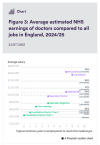A few thoughts in relation to the Junior (Resident) Doctors strike.
When talking about doctors people do seem to conflate junior doctors with GPs, senior doctors, consultants and surgeons. Junior doctors are just starting their career and still undergoing training and as with any professional job you are generally underpaid for what you do whilst in your first few years but are remunerated much more handsomely later. Senior nurses are often significantly more capable and in some cases more qualified than junior doctors, yet will never have salaries matching those of a Junior Doctor after 7yrs training.
Contrary to popular belief there is not a shortage of doctors in the UK, there are doctors who are unemployed. What there is, is a shortage of funding for additional doctors in the NHS. So more roles needs opening for doctors, which doesn't come down to paying junior doctors more, its related to the structural funding of the NHS.
The argument that its much better to be a doctor in Aus and Nz again is a fallacy. Whilst pay is initially better, the occupational pension is no where near as generous and remembering that if you then choose to retire in Australia the state pension is also means tested. Overall the package is broadly similar and thats before you factor in the outrageous house prices in Australia.
The strikes will result in a backlog which can only be managed by increased amounts of working overtime at enhanced rates, therefore the strike action not only causes severe pressure on the stretched NHS budget but also results in a nice bit of overtime for the junior doctors when they return.
Considering the pay awards that they have been given over the past 2 yrs and the state of UK finances, the strikes seem, at least to me an act of greed rather than need. On the whole they seem to get a pretty good deal.
They are on an almost guaranteed career path which allows them to earn a salary which would put them well within the top 2% of the population along with an exceptionally generous pension. This is before the option to do private consultation later in their career in conjunction with their NHS job which would push them well into the top 1%.



